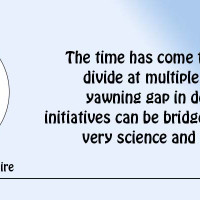- Friday, 23 January 2026
Nepal's Journey To LDC Graduation
Graduation from the United Nation’s Least Developed Countries (LDCs) category is seen as an essential milestone in the development path of each LDC. It demonstrates the country’s performance in key macroeconomic indicators and broad-based social developments. Nepal's achievement of most of the Millennium Development Goal (MDG) targets with a comparatively more inclusive development paradigm was able to add confidence in committing to graduating into a developing country. The 15th Periodic Plan (2019/20-2023/24) is expected to create a foundation for Nepal to graduate into an upper-middle-income country by achieving its Sustainable Development Goals (SDGs) well before 2030.
The Committee for Development Policy (CDP) considered eligible for graduation from the LDC category for the first time in its 2015 triennial review of the list of LDCs, as Nepal met the Human Assets Index (HAI) and Economic and Environmental Vulnerability Index (EVI) criteria while remaining as a low-income country. Furthermore, the nation met the same two criteria for the second consecutive time in the 2018 triennial review. However, in view of the sustainability of graduation, the country requested CDP to defer its consideration for graduation to the triennial review of 2021. The massive earthquake of 2015 followed by economic blockades by India, border disputes of 2015/16 and natural disasters, including floods in 2017, smashed the economy. Later, the United Nations General Assembly (UNGA) unanimously adopted a resolution endorsing the graduation from the LDC category in 2021 with a preparatory period of five years.
Triennial review
According to the CDP’s Triennial Review 2015, 2018 and 2021, the GNI per capita income increased from $659 in 2015 to $745 in 2018 and to $ 1027 in 2021. Similarly, the Human Asset Index of 68.7 in 2015 rose to 71.2 in 2017 and to 75 in 2021. The economic vulnerability index of 28.4 remained the same in 2017 and increased to 24.7 in 2021. With a per capita income of just 60 per cent of the graduation threshold level of per capita income, it was extraordinary for Nepal to meet the HAI and EVI. Apparently, Nepal´s GNI per capita as of the 2021 triennial review is about 16 per cent below the graduation threshold of ¨US $ 1225¨. However, the HAI is 13 per cent above the threshold of ¨66 above¨ and the EVI is 22 per cnet above the threshold of ¨32 below¨.
The Istanbul Programme of Action aspired to enable half the least-developed countries to graduate to developing countries by 2020. According to the UNCTAD, six countries-- Botswana, Cabo Verde, the Maldives, Samoa, Equatorial Guinea and Vanuatu-- have graduated so far. The 2021 Triennial Review recommended the graduation of Bangladesh, Lao People´s Democratic Republic and Nepal. Bhutan, included in the category of Least Developed Country (LDC) since 1971 with Nepal is set to graduate in 2023.
However, graduation from a group of the world´s poorest countries will be challenging for LDCs. Once graduated from its LDC status, Nepal will lose several entitlements related to trade, aid, and support for participation in international forums. These include international support measures such as duty-free, quota-free market access for goods and services and rules of origin, and the special treatments from the World Trade Organisation (WTO). Moreover, Nepal will no longer be eligible for concessional loans and grants as LDCs and least developed climate funds. The nation’s access to the ODA, debt, technology, and investment will have no direct impact.
Studies have forecasted a decline in total exports of commodities by about 3.7% due to raised export costs caused by the erosion in trade-related international support measures after the graduation from LDCs (NPC/UNDP2020). The reduction in the export of goods such as pashmina, apparel, and woollen carpets will have some direct negative impact. Moreover, this may result in a decline in the export of these products and may adversely affect the manufacturing sector. A few thousand workers working for these industries may be forced to leave.
LDC graduation will unlock several prospects for development as well. National economic dignity will be promoted through entering the club of developing countries. Nepal has a huge scope for foreign investment through enhanced credibility, credit rating, and investment security. To utilize the opportunities unfastened and overcome the challenges faced, adequate preparations at national and international levels are essential.
Smooth transition
Nepal needs to expand the opportunities of a multidimensional connectivity network, identify new areas of collaboration, and enhance mutual trust and confidence with the rest of the world. Moreover, the country needs to create a conducive environment for foreign investment and technology transfer. The National Planning Commission is formulating a ´Graduation Strategy´ for attaining a smooth transition and irreversible graduation. The strategy is expected to provide guidelines and action plans to grab opportunities and compensate for the loss caused due to graduation. Furthermore, the government has been negotiating with the World Trade Organization (WTO) for an extension of the preferences after graduation.
Nepal’s graduation from LDC Nepal is landmark for her economic transformation. This should be supported by solid political willingness and administrative proactiveness. An effective and robust plan, a smooth transition strategy followed by implementation programs, participation and ownership of private sectors, and backup from the international community will be the key. All stakeholders and development partners should internalise the transition strategy. A foundation for inclusive, resilient, and sustainable development should be built for an irreversible graduation of Nepal from the LDC category.
(Aarati is an under-secretary at the Ministry of Federal Affairs and General Administration.)









-original-thumb.jpg)







